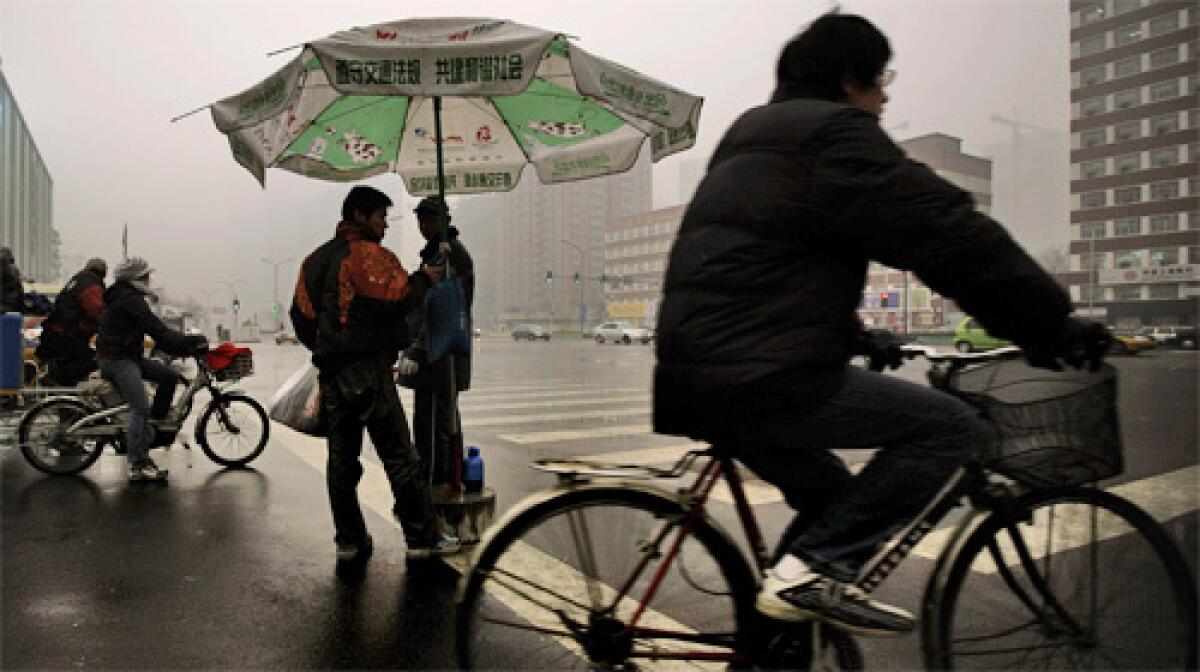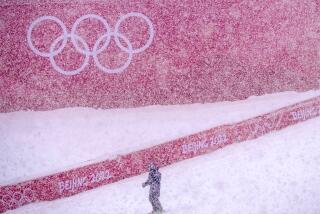China plans to halt rain for 2008 Olympics

Beijing
It is yet another attempt by man to triumph over nature.
Determined not to let anything spoil their party, organizers of the 2008 Summer Olympics said Wednesday that they will take control over the most unpredictable element of all -- the weather.
While China’s Olympic athletes are getting ready to compete on the fields, its meteorologists are working the skies, attempting the difficult feat of making sure it doesn’t rain on the Aug. 8 opening ceremonies.
“Our team is trained. Our preparations are complete,” declared Wang Jianjie, a spokeswoman from the Beijing Meteorological Bureau, addressing a news conference at the headquarters of the Beijing organizing committee.
The Chinese are among the world’s leaders in what is called “weather modification,” but they have more experience creating rain than preventing it. In fact, the techniques are virtually the same.
Cloud-seeding is a relatively well-known practice that involves shooting various substances into clouds, such as silver iodide, salts and dry ice, that bring on the formation of larger raindrops, triggering a downpour. But Chinese scientists believe they have perfected a technique that reduces the size of the raindrops, delaying the rain until the clouds move on.
The weather modification would be used only on a small area, opening what would be in effect a meteorological umbrella over the 91,000-seat Olympic stadium. The $400-million stadium, nicknamed the “bird’s nest” for its interlacing steel beams, has no roof.
“This is really a very complex process in terms of selecting the place and the time,” said Wang Yubin, an engineer from the meteorological bureau. “Probably we will have to decide one day before or very close to the event.”
Jeff Ruffalo, a public relations advisor to the Beijing Olympics, believes this is a first for the Summer Olympics, which in recent years have taken place in drier cities -- Athens, Sydney, Barcelona.
Summer is the rainy season in Northeast Asia. Originally, the Beijing Olympics were to open July 25, but meteorologists urged that the date be pushed back as late as possible. Still, the chances of rain in Beijing on Aug. 8 are close to 50%.
Training with the Olympics in mind, the meteorologists have been practicing their “rain mitigation” techniques since 2006. They have had a couple of dry runs, so to speak -- a China-Africa summit and a panda festival in Sichuan province, among others.
The Chinese have been tinkering with the weather since the late 1950s, trying to bring rains to the desert terrain of the northern provinces.
The bureau of weather modification was established in the 1980s and is now believed to be the largest in the world. It has a reserve army of 37,000 people -- most of them sort of weekend warriors who are called to duty during unusual droughts. The bureau has 30 aircraft, 4,000 rocket launchers and 7,000 antiaircraft guns, said Wang Guohe, director of weather modification for the Chinese Academy of Meteorology.
“We have the largest program in the world with the most people involved and the most equipment, but it is not really the most advanced,” Wang said. That honor belongs to the Russians, who he says used sophisticated cloud-seeding in 1986 to prevent radioactive rain from the Chernobyl reactor accident from reaching Moscow.
Although many scientists dispute the effectiveness of weather modification, Wang insists that it has been successful in China on a limited scale.
“If you’re talking about a small rainfall, you can eliminate it,” Wang said. “But if it’s going to be raining cats and dogs, there’s nothing man can do about it.”
barbara.demick@latimes.com
More to Read
Sign up for The Wild
We’ll help you find the best places to hike, bike and run, as well as the perfect silent spots for meditation and yoga.
You may occasionally receive promotional content from the Los Angeles Times.






